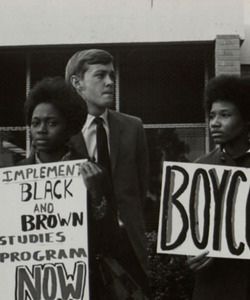February 3rd, 2023 Celebrating Black History Month
3 min read
February is Black History Month in the United States. Acknowledging, understanding, and celebrating Black history is especially important for the field of child welfare, which has historically caused great harm to Black children and families in the United States. Structural racism in the child welfare system has led to an overrepresentation of children and youth of color in child welfare, child protection, and juvenile justice. Black families are disproportionately represented in child welfare and are more likely to experience negative outcomes compared with white families. Knowing exactly how the system has caused harm to the Black community is a vital first step as we work to address racial disparities and inequities in our work.

The origins of this important month date back to 1926, when Dr. Carter G. Woodson, the founder of the Association for the Study of African American Life and History (ASALH), established “Negro History Week” during the second week of February. He chose this week as it contains the birthdays of both Frederick Douglass and Abraham Lincoln, both important symbols of American freedom.
During the civil rights movement of the mid-1960s, college students across the nation began advocating for African American studies courses and Black Studies departments on their campuses. ASALH sought recognition from the federal government, and in 1976, President Gerald Ford verbally declared February as Black History Month in homage to Dr. Woodson and the work of the ASALH. 10 years later in 1986, the U.S. Congress formally designated February as Black History Month through a joint resolution of the House and Senate.

Today, the ASALH continues its vital work of highlighting the importance and significance of Black history in the United States, and each year they declare a national theme for Black History Month. The theme this year is Black Resistance. Visit their website to learn more about this year’s theme and their month-long Black History festival.
There are many ways in which we can work to advance racial equity and healing in the field of child welfare. Considering the cultural trauma which the Black community has experienced, providing services in a way that is culturally responsive can help foster healing by allowing individuals to process past grief and trauma and create new narratives.
Another important action is local and federal legislation aimed at dismantling structural racism in the child welfare system. In Minnesota, the African American Family Preservation Act was introduced in the house in 2021 and has been supported by advocates and community members. The bill’s primary author, Representative Agbaje, describes the bill’s goals: “Instead of jumping to arbitrary child removal, this legislation would change our system to focus on strengthening families while always putting the best interest of the child first. In addressing these disparities, we promote united, healthy families, which are a tremendous benefit for Minnesota.” Understanding and being involved in the work our local and federal legislators are doing to address child welfare disparities is an important piece of improving outcomes for Black children and families.
Learn more about Black history, child welfare, and what you can do to help reduce racial disparities in the child welfare system through these great resources: